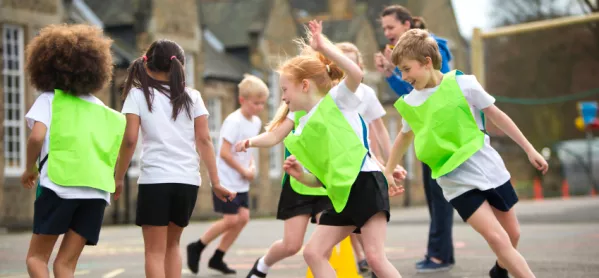A howling wind whips across the concrete wasteland, chilling you to the bone. There are screams in the distance - yelps of pain and mocking taunts - and a lost soul haunts you, tugging at your coat.
That’s right: it’s your playground duty again. Game of Thrones has got nothing on the freezing temperatures and acts of violence that you witness out here every week.
Nobody loves break duty, but unfortunately it’s a necessary evil. You might think that getting through it is just a case of huddling deeper into your fleece-lined anorak and blowing the whistle at the appropriate moment, but this won’t help you to avoid the most common breaktime pitfalls.
Here are some dos and don’ts for the playground duty.
DON’T get drawn into conflicts
Kids fall out all the time - the playground is a hotbed of conflicts and petty rivalries. Believe it or not, this is a great opportunity for children to build social skills; they need to learn how to deal with disagreements and difficult people, and the playground is perfect for this.
Resist the temptation to jump in and mediate because the chances are that pupils can work it out for themselves. If you must interfere, ask questions to help them to resolve the conflict themselves: “How do you feel about that?”, “How could you compromise?”, “What do you think you should do next?”
Just keep an eye out for pupils who repeatedly antagonise others because this can lead to bullying and might also be a sign that those pupils need some extra help with their social skills.
DON’T let bad behaviour slide
Breaktime is a great opportunity for kids to run free and release tension, but boundaries must still be in place and if you don’t stick to them, things can get out of control. Bullying, deliberately hurting others, going out of bounds and doing anything to endanger anybody all require a zero-tolerance approach, just as there would be in the classroom.
DON’T take your eye off the ball
It’s difficult to keep tabs on so many children at once and it’s tempting to let your mind wander while you wait for the bell, but you need to be vigilant. Injuries can occur, pupils can wander, dangerous games can be started. You can’t have eyes in the back of your head, but do look in all directions regularly.
DO dispatch the ‘Klingons’
There is always the one child who would rather cling to your hand than play with their friends. It seems harmless, but it’s distracting for you and it’s stopping them from interacting with other children. Gently encourage them to go and play. If you have two clingy hand holders, then they can often be persuaded to play together close by.
DO deal with injuries properly
A wet paper towel might be the traditional primary school cure for a scraped knee, but do send children in to a first-aider to get checked over properly when they’re hurt. They may emerge triumphantly clutching said wet paper towel, but they may also need a graze cleaning or even to be checked out at A&E.
DON’T over-scaffold play
There seems to have been a decline in imaginative play since I was at school, with children at a loss if they don’t have a football to kick or a skipping rope to twirl. Providing a lot of playground equipment can keep pupils occupied, as can play leaders running playground games, but there is no substitute for imaginative play.
Resist the temptation to set up games for bored children - being bored occasionally is what sparks ideas and I’d rather see a group of kids inventing an impromptu game of ‘Zombie Apocalypse Caterpillars from the Future’ than playing ‘Duck Duck Goose’ for the fourth time this week.
DO pass on information
Class teachers need to know if there has been a problem with one of their pupils in the playground. Dealing with behaviour and children’s emotional wellbeing is much easier if you have the full picture, so do give your fellow staff a quick update on any issues once break is over.
DO teach pupils how to peel an orange
Otherwise your attention is going to be taken up by doing this and opening bananas, while a full-scale “riot” takes play at the other end of the field. Show them how to do it in September and reap the rewards for the rest of the year. And hide your break-time biscuit in your pocket or they’ll all want one.
Lisa Jarmin is a teacher and freelance writer





